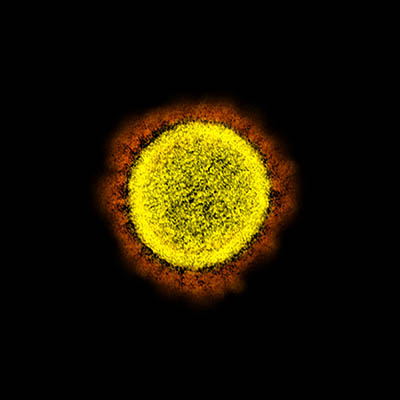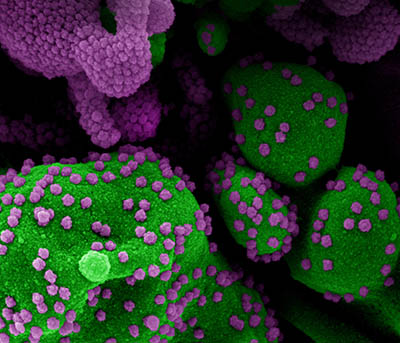COVID-19 Timeline at NIH (September–October 2021)
COVID-19 Research and Activities at NIH (September–October 2021)

CREDIT: NIAID
Transmission electron micrograph of SARS-CoV-2 virus particles, isolated from a patient. Image captured and color-enhanced at the NIAID Integrated Research Facility (IRF) in Fort Detrick, Maryland.
September 1: A phase 2 clinical trial led by NHLBI scientists finds that the drug fostamatinib was well tolerated and showed early signs of clinical efficacy when used to treat patients with COVID-19 with severe disease. The drug is currently used as a tailored immune therapy to treat adults with a rare bleeding disorder. (Clin Infect Dis ciab732, 2021; DOI:10.1093/cid/ciab732)
September 3: In his all-staff email, NIH Director Francis Collins reports that COVID-19 cases have reached their highest levels since winter, while U.S. vaccination rates continue to rise with 900,000 doses on average administered each day. He links to an updated NIH COVID-19 vaccination page and notes that NIH is developing a plan to provide booster doses to employees once the FDA and CDC support the need for them.
September 7: In his NIH Director’s Blog, Francis Collins shares research revealing that the number of Americans infected with SARS CoV-2 by December, 2020, was likely five times as great as initially thought. (Nature 598:338–341, 2021; DOI:10.1038/s41586-021-
September 9: President Joseph Biden issues a six-point action plan to end the pandemic that focuses on vaccinating the unvaccinated. The plan mandates that all federal executive branch employees and employees of contractors who do business with the federal government be vaccinated against COVID-19 without an option to opt out, except in limited circumstances such as a disability or a religious objection. Vaccine requirements also extend to companies with greater than 100 employees and health care facilities that participate in Medicare and Medicaid. He announces additional orders that require entities that contract with the federal government to provide adequate COVID-19 safeguards to their workers.
September 10: NIH Director Francis Collins hosts the 8th Virtual Town Hall (for NIH only) with NIH Deputy Director for Management Alfred Johnson, NIAID Director Anthony Fauci, NIH Chief People Officer Julie Berko, and NIH Office of Research Services Director Colleen McGowan, with over 14,000 staff attending online. The NIH leaders answer questions and provide an update on the state of the pandemic, treatments and vaccinations; new vaccination and testing requirements; and return to the physical workplace plans.
September 10: Deputy Director for Management Alfred Johnson authorizes an extension to the excused absence policy for those caring for a dependent family member. The policy is now effective through March 9, 2022, and the ability to telework with dependents at home remains in place.
September 14: In his blog, NIH Director Francis Collins highlights a new study by investigators in the United Kingdom that found breakthrough infections in vaccinated people were less likely to cause long COVID syndrome. (Lancet Infect Dis 2021; DOI:10.1016/S1473-3099(21)00460-6
September 15: NIH’s Researching COVID to Enhance Recovery Initiative awards nearly $470 million to New York University (NYU) Langone Health, New York. NYU will make multiple subawards to more than 100 researchers at over 30 institutions to support new and existing studies on the long-term effects of COVID-19.
September 17: HHS Assistant Secretary for Administration Cheryl Campbell emails all HHS staff with a timeline schedule to comply with the new federal requirement to be fully vaccinated by November 22, 2021. She announces that HHS will launch an electronic form for employees to confirm their COVID-19 vaccination status and upload supporting documentation.
September 17: In his weekly email, NIH Director Francis Collins reminds all staff of the government-wide vaccination requirement. He reports today’s FDA recommendation that individuals 65 years of age and older and those at high risk of exposure or severe symptoms be administered a vaccine booster dose. Collins mentions the ongoing application process for group C employees to return to the physical workspace as well as updated COVID-19 safety guidance at NIH. He ends his message by expressing gratitude to the 99 police officers and 22 emergency communications dispatchers running the 911 system at NIH.
September 23: NIH Deputy Director for Management Alfred Johnson announces that starting October 1, 2021, conference attendance requests will no longer require NIH leadership approval. Staff who would like to attend a non-NIH-hosted conference should work with their IC administrative staff and supervisors to obtain approval based on their office’s internal process.
September 24: HHS Assistant Secretary for Administration Cheryl Campbell announces HHS will begin COVID-19 vaccination verification efforts as early as next week for federal employees and continue them on a rolling basis.
September 24: At least three promising antiviral pills for COVID-19 are being tested in clinical trials as reported by Kaiser Health News. Like tamiflu, which is given after a flu diagnosis, the antivirals would conceivably stop symptoms from developing after exposure and limit the duration of the infection. The top contender is a medication from Merck & Co. and Ridgeback Biotherapeutics called molnupiravir. Results from clinical trials are expected as soon as late fall or winter, according to Carl Dieffenbach, director of the Division of AIDS at NIAID, who is overseeing antiviral development.
September 28: NIAID awards approximately $36.3 million to three academic institutions to fuel vaccine research for a diverse family of coronaviruses. “These new awards are designed to look ahead and prepare for the next generation of coronaviruses with pandemic potential,” said NIAID Director Anthony Fauci.

CREDIT: NIAID
Colorized scanning electron micrograph of an apoptotic cell (green) heavily infected with SARS-COV-2 virus particles (purple), isolated from a patient sample. Image at the NIAID Integrated Research Facility (IRF) in Fort Detrick, Maryland.
October 1: In his email to staff, NIH Director Francis Collins addresses the executive order requiring federal employees to be fully vaccinated by November 22, 2021, and contractors by December 8, 2021. He directs staff to the vaccination requirements intranet page for information on scheduling vaccinations and exemptions. He also points to a promising unpublished phase 3 trial reporting that the oral antiviral drug molnupiravir reduced hospitalizations by 50% when given to high-risk outpatients with a recent diagnosis of COVID-19.
October 4: A large surveillance study led by scientists from NCI and NIMHD finds that the global COVID-19 pandemic caused more deaths in Black, American Indian and Alaska Native, and Latino groups in the United States than in white or Asian individuals. (Ann Intern Med 2021; DOI:10.7326/M21-2134)
October 5: NIH Director Francis Collins announces that he will end his tenure as director by the end of this year. Collins was appointed in 2009 by President Barack Obama and is the longest-serving director in NIH history. President Joseph Biden recognizes Collins as one of the most important scientists of our time for his achievements that range from mapping the human genome to fighting the COVID-19 pandemic.
October 5: In his blog, NIH Director Francis Collins highlights a new study that found most vaccine-hesitant people are willing to change their minds. (JAMA Netw Open 9:e2126882, 2021; DOI:10.1001/jamanetworkopen.2021.26882)
October 6: A study led by NIDA scientists finds that fully vaccinated people with substance-use disorders may be at higher risk for SARS-CoV-2 breakthrough infections. The results suggest that the increased risk was likely due to co-occurring diseases and adverse socioeconomic characteristics. (World Psychiatry 2021; DOI:10.1002/wps.20921)
October 7: An NIDA-led study finds that more than 140,000 U.S. children lost a primary or secondary caregiver due to the COVID-19 pandemic and highlights stark disparities in caregiver deaths by race and ethnicity. (Pediatrics 2021; DOI:10.1542/peds.2021-053760)
October 14: The NIH Rapid Acceleration of Diagnostics initiative announces contract awards totaling $77.7 million to develop and manufacture 12 new rapid diagnostic tests for SARS-CoV-2. “These technologies represent important innovations to address the need for ready access to rapid, low-cost tests everywhere in the country, including in every home,” said NIBIB Director Bruce Tromberg.
October 15: NIH Director Francis Collins emails all staff marking his 100th coronavirus update. With the upcoming federal vaccination mandate deadline approaching, he directs employees vaccinated somewhere other than NIH to report their status online through the COVID-19 Vaccination Status Form. Collins reports that the FDA’s Vaccines and Related Biological Products Advisory Committee voted to expand the emergency use authorization of the Moderna vaccine for the administration of an additional booster dose for higher-risk individuals. Specifically, people older than 65 years of age and 18—64 year olds at high risk of severe COVID-19 or with frequent occupational exposure. He concludes by expressing gratitude to NIH’s Animal Care and Use Program staff who have played a critical role in caring for the animals used in research throughout the pandemic.
October 15: An NIH-funded study finds that antibody treatment for multisystem inflammatory syndrome (MIS-C) in children works by depleting inflammatory immune cells. MIS-C is a rare condition that usually affects school-age children who initially had only mild COVID-19 symptoms or no symptoms at all. (J Clin Invest 131:e147076, 2021; DOI:10.1172/JCI147076)
October 18: A clinical trial supported by NIH finds that the immunomodulator interferon beta-1a does not improve outcomes for hospitalized adults with COVID-19. (Lancet Respir Med 2021; DOI:10.1016/S2213-2600(21)00412-4)
October 19: In his blog, NIH Director Francis Collins features a Swedish study that found vaccination is a key strategy for reducing transmission of SARS-CoV-2 within families. (JAMA Intern Med 2021; DOI:10.1001/jamainternmed.2021.5814)
October 20: NIH Director Francis Collins releases a statement addressing the NIH-supported research (funded through a subaward from NIH-grantee EcoHealth Alliance) to understand naturally occurring bat coronaviruses at the Wuhan Institute of Virology (Wuhan, China). Analysis of published genomic data and other documents from the grantee demonstrate that the coronaviruses studied under the NIH grant are genetically far distant from SARS-CoV-2 and could not have caused the COVID-19 pandemic.
October 21: NIAID scientists and colleagues find that a booster dose of the mRNA-1273 COVID-19 vaccine given to rhesus macaques (Macaca mulatta) about six months after their primary vaccine series significantly increased concentrations of neutralizing antibodies against all known SARS-CoV-2 variants of concern. (Science 2021; DOI:10.1126/science.abl8912)
October 29: In his weekly email, NIH Director Francis Collins reports that over 88% of NIH federal employees are fully vaccinated and reminds staff of the upcoming November 22 deadline to meet the federal COVID-19 vaccination mandate. Also effective today, fully vaccinated staff can submit requests for non-mission-critical travel for approval. Collins mentions that this week, the FDA’s Vaccines and Related Biological Products Advisory Committee met and voted to recommend emergency use authorization of Pfizer’s COVID-19 vaccine for children ages 5 through 11. And beginning November 1, NIH will begin offering Pfizer (now known as Comirnaty) and Moderna COVID-19 boosters to a limited portion of the NIH staff. Staff are eligible if they are six months past receiving their second dose of either Pfizer or Moderna at the NIH and are in vaccination phases 1A, 1B, or staff in phase 2B at the Office of Research Facilities.
October 29: The NIH Clinical Center updated its patient/visitor screening process. Review information about the screening process here: https://www.cc.nih.gov/sites/nihinternet/files/internet-files/participate/_pdf/COVID-19_Fact_Sheet.pdf
This page was last updated on Monday, January 31, 2022
